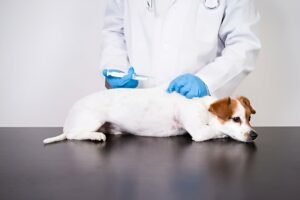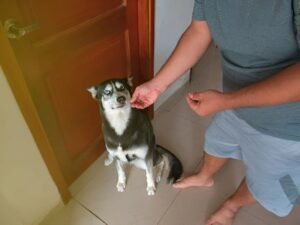My Dog Has Diarrhea But Is Acting Fine–Why is That?
Seeing our four-legged friends struggle with stomach problems can be upsetting. It can be perplexing when your dog has diarrhea but acts normally; should you be concerned or ignore the symptoms?
We’ll go over the specifics of canine diarrhea, look into possible reasons, talk about why your dog might be functioning normally despite the condition, and provide advice on how to handle this frequent issue.
What Is Diarrhea in Dogs?
The majority of pet parents are aware of dog diarrhea. The illness is characterized by significant amounts of loose or watery feces passed more frequently than normal.
Though it is a symptom of numerous illnesses, diarrhea is not a single disease. To determine the best course of action and prognosis for your dog’s diarrhea, your veterinarian must identify the underlying reason.
In dogs, diarrhea is a common problem. Loose feces in your pet may result from eating something strange or, more seriously, a toxin or viral illness.
Whatever the cause of your dog’s diarrhea, you want to know how to treat it and if you should take them right away to the doctor or monitor them at home.
Everything you need to know about My Dog Has Diarrhea But Is Acting Fine.
What causes diarrhea in dogs initially?
To start comprehending diarrhea, let’s quickly review anatomy and physiology. Among other things, the small and large intestines of your dog are in charge of absorbing nutrients and liquids from the food they eat and eliminating the remaining intestinal contents, or ingesta, from their bodies as feces.
Occasionally, though, a dog may have loose or badly formed stools in place of well-shaped ones (diarrhea). This could happen when:
The portion of the intestines that contains the ingesta is called the intestinal lumen, and it receives more fluid secreted by the intestinal cells.
Increased fluid, electrolytes, and blood entry into the intestinal lumen are caused by inflammation or erosion of the intestinal walls.
More fluid enters the intestinal lumen due to particles in the ingesta.
Food passes through the intestines more quickly as it passes through, which reduces the amount of time that may be used to remove extra fluid.
What Kinds of Diarrhea Are There in Dogs?
Both people and dogs can have three different kinds of diarrhea. Your dog may experience extreme stress if they have diarrhea. They might experience some pain and discomfort as a result of it. The various forms of diarrhea in dogs are explained below.
Acute Watery Diarrhea
This kind of diarrhea appears suddenly and is quite fluid. Like you, your dog may experience diarrhea that necessitates immediate urination. Your dog will let you know when they’re tired and ready to go outside. They have the same needs as we do.
Acute Bloody Diarrhea
The symptoms of acute bloody diarrhea in dogs are identical to those of acute watery diarrhea. It is more severe, though. There are various ways that blood might appear in your dog’s feces. Either bright crimson-streaked feces or black tarry stools could be present in your dog.
Additionally, the stool may contain mucous or be colored differently. Blood in your dog’s feces may indicate one of the following:
- Fresh blood from the colon or rectum appears as a red, bloody stool.
- Digested blood from the stomach, upper small intestine, or esophagus is present in black, tarry stools.
- Red or pink stools point to small intestine hemorrhage in your dog.
- Hemorrhagic gastroenteritis may be the cause of the black, jelly-like stools.
- Your dog might be throwing up if they have hemorrhagic gastroenteritis. Take your dog to the vet right away if you see any of these signs.
Chronic Diarrhea
Dogs suffering from chronic diarrhea are suffering from a serious illness. You need to take your puppy to the vet if you discover that it has had diarrhea for longer than twenty-four hours. It is risky for your dog to get dehydrated due to water loss in the stool, so make sure they drink enough water.
What Leads to Dog Diarrhea?
Dogs frequently get diarrhea, which can have a variety of causes. Numerous factors can upset your dog’s sensitive system and cause diarrhea. Observing your dog will be necessary to ascertain the root of the issue.
Some of the causes of diarrhea in dogs are listed below.
Digestive Issues
Eating food that irritates the stomach is the most common cause of acute watery diarrhea in dogs. Dogs may experience unsettled stomachs, and diarrhea will cause the meal to be rapidly removed from their system. The following can lead to digestive issues:
If there is no transition phase and you are abruptly switching your dog’s diet from dry to wet food or from wet to dry.
- Because it ate human food off of your plate, your dog is bloated.
- Your dog has been consuming trash for food.
- Your dog can be turning down foods that aren’t high in nutrients.
- To maintain their health, dogs naturally yearn for a food rich in nutrients and well-balanced. You might want to consider what your dog is eating if they are experiencing diarrhea.
If the food contains a lot of artificial flavoring and additives, your dog’s system could not react well to it. Your dog may be trying to tell you that they need better nourishment if they are experiencing diarrhea.
Stress and Anxiety
The following circumstances might occasionally cause dogs to become tense:
fresh individuals
new or uncomfortable locations
Unknown items
loud sounds
Separation anxiety is another possibility for your dog, which may be quite stressful for them. Watch out for your dog’s stressors and consider how you might be able to assist.
Parasitic Infection
Your dog’s body will eliminate the parasite through the digestive system if they have a worm infestation. Diarrhea will be brought on by this infection.
Bacterial or Viral Infection
If your dog consumes or breathes something unfamiliar to them, they may have a bacterial infection, which can lead to diarrhea.
Bowel Syndrome
Stress is the usual cause of irritable bowel syndrome. Dogs with IBS that are sensitive to environmental changes are frequently diagnosed with it.
Why is My Dog Has Diarrhea But Is Acting Fine?

However, there are other reasons why a dog with diarrhea could still be in good health. Among the frequently guilty parties are:
Dysbiosis, or an unbalanced bacterial population in the intestines
- Pathogenic infection (e.g., giardiasis, coccidia, roundworms, and hookworms)
- Inconsiderate eating (e.g., ingesting foreign items, absorbing plants or toxins, eating trash or damaged food, etc.)
- Less serious viral or bacterial illnesses
- Introducing your dog to a new diet, treat, or chew toy
- Medication (such as antibiotics, chemotherapeutic treatments, steroids like prednisone for dogs, or non-steroidal anti-inflammatory drugs like carprofen for dogs)
- Stress (from things like moving, boarding, having guests over, getting a new pet, etc.)
Additionally, certain dogs with a condition that causes diarrhea may be behaving unwell, which would complicate matters even more. Yet, other dogs who share the same illness might not exhibit any more signs. For example, puppies with severe infestations of parasites may not only vomit but also show signs of acute anemia (low red blood cell counts), diarrhea, and lethargy. However, stinky, watery diarrhea may be the only clinical symptom in a healthy adult with a lower worm burden.
Furthermore, a dog with diarrhea may initially act normal before developing nausea as a result of dehydration or a worsening of the illness. Overall, this indicates that although diarrhea is widespread, it is not a simple matter.
How do I handle a dog who has diarrhea?
It makes sense that dog owners would find it challenging to determine the appropriate course of action for their dog’s diarrhea. Thankfully, most diarrhea episodes in well-mannered dogs end on their own. This indicates that they go away on their own, frequently without the need for medical assistance.

But as we’ve just seen, not all diarrhea is benign. It might indicate a more serious illness. Furthermore, if a dog has watery diarrhea for more than a few days, even dogs with mild cases may get dehydrated. This is the reason it’s critical to understand when and how to step in.
Watery diarrhea or diarrhea with little mucus
Dogs who are acting normally and have soft, watery diarrhea or diarrhea with little mucous in it can usually wait a day or two to see a veterinarian. This offers you an opportunity to test some natural therapies and see whether the diarrhea goes away. If it doesn’t work or becomes worse, it’s time to take your dog to the veterinarian.
Green or yellow diarrhea
Although these conditions can be startling, if your dog is acting normally, you should usually wait a day or two before taking them to the clinic. Nevertheless, it’s critical to seek veterinary attention right away if your dog is acting ill or if there’s a possibility that your dog may have gotten into a rat or snail bait, which usually contains a green or blue dye.
Squatting in the grass to relieve themselves, a puppy. The type and color of your dog’s diarrhea can indicate how serious it is.
Diarrhea that is bloody, explosive, or black
On the other hand, if your dog displays any of the following signs of diarrhea, you should make an appointment with your veterinarian as soon as possible. (Or, if the symptoms are severe, think about making an emergency veterinarian appointment at the urgent care facility or clinic.)
- Black, tarry diarrhea (which may be a sign of bleeding in the upper gastrointestinal tract).
- Severe diarrhea (which can be extremely uncomfortable and quickly lead to dehydration).
- Bloody diarrhea (which may be a sign of hemorrhagic gastroenteritis or other colon hemorrhage).
(Bloody diarrhea is defined as diarrhea that contains a large amount of blood). Diarrhea in dogs with an inflammatory colon may occasionally contain a small blood splotch. This small amount of blood usually has less urgency than actual bloody diarrhea, though it’s still worrying.)
When in doubt, see your veterinarian
I’ve attempted to provide you with some broad guidelines for when to take a dog that is acting normally yet has diarrhea to the vet. However, I do not wish to minimize the significance of your pet parent’s intuition. Do not hesitate to contact your veterinarian if your intuition tells you that your dog is having problems or if you have concerns about any of his or her symptoms. He or she can advise you on whether to schedule an appointment right away or to attempt some at-home treatments (which we shall discuss shortly) for a few days.
What should I anticipate if my dog needs to visit the veterinarian?
If your dog ends up at the vet, the vet staff will likely start by inquiring about your dog’s health issues, nutrition, shots, and other details. This information can occasionally assist in somewhat reducing the number of prevalent causes of diarrhea. The veterinarian will then conduct an extensive physical examination. He or she will be particularly focused on your dog’s level of hydration, as well as any results from the rectal exam and abdominal palpation.
Fecal examination and further testing
The veterinarian will talk with you about any diagnosis once they have gathered this data. A fecal test for dogs is frequently the sole diagnostic the veterinarian may provide when a dog exhibits symptoms of diarrhea but appears well and passes a physical examination. (If at all feasible, please bring a fecal sample to the appointment to aid your veterinarian.) Your veterinarian can assess the stool’s appearance and rule out parasites with the aid of these fecal tests.
When a dog has diarrhea, your veterinarian may also perform a parvo test, blood testing, X-rays, ultrasounds, and other tests. But since it’s typically not required (and frequently prohibitively expensive) to examine for every cause of diarrhea in a dog that is performing normally, the fecal exam is an excellent place to start.
However, your veterinarian may perform some of the aforementioned tests if they have reason to believe that your pet has parvo, organ damage, toxin exposure, or other more serious causes of diarrhea. Additionally, additional testing is frequently necessary if your dog’s diarrhea doesn’t go away after a few days of symptomatic therapy or if it continues coming back.
When a dog has diarrhea but is acting normally, how do veterinarians treat it?
Your veterinarian will create a treatment plan based on the findings of the fecal test, physical examination, and any other tests that may be necessary. If the veterinarian determines that the dog’s diarrhea has a parasitic origin, for example, the dog may be treated specifically for that issue using anti-parasitic drugs. Additionally, the veterinarian might give your dog subcutaneous fluids if they are dehydrated. Alternatively, the veterinarian could advise hospitalization for IV fluids and additional therapies in the event of severe diarrhea or more severe dehydration.

When a dog had acute diarrhea in the past, metronidazole was an often prescribed antibiotic. Veterinarians have, however, been using it less frequently as of late due to its detrimental effects on normal gut bacteria and the scant evidence supporting its effectiveness. A 2022 study showing that nutritional treatment was superior to metronidazole in dogs with acute colitis (i.e., colon inflammation) supports this move away from metronidazole.
For dogs who are otherwise asymptomatic, supportive care is therefore the cornerstone of treatment for the majority of instances of diarrhea. Probiotics, fiber supplements, and/or a bland diet for dogs are usually part of the treatment.
How Can I Treat Diarrhea in My Dog?

It’s critical to seek advice from your veterinarian when your dog exhibits signs of digestive distress. Treat your dog’s diarrhea at home only if a veterinarian is watching. Here are a few different ways you may support your dog:
Fasting
If it’s acceptable for your dog, your veterinarian might advise you to try delaying feeding him or her for a full twelve to twenty-four hours. Small amounts of water should be given to them throughout this period. But you must keep them hydrated.
This can be achieved by giving your dog Pedialyte which has no flavor. A fast could help the unpleasant stomach to go away. It’s typically the first thing your veterinarian would suggest you try to do to make your dog feel better.
Bland Diet
Consider giving your dog a bland diet consisting of cooked chicken and white rice. Don’t season the rice or the chicken in any way. Make it simple.
In a few days, if it is effective, your dog should start to have firmer stools. For your veterinarian to track your dog’s development, please stay in touch.
Specially Formulated Dog Foods
Your veterinarian might advise you to give your dog something different while they recover from their diarrhea episode, but you can still feed them food. Changing your dog’s diet for a period may be required if you don’t want their illness to get worse.
Probiotics
Probiotics can both prevent and treat diarrhea. Some beneficial bacterial strains may help reduce the frequency of diarrhea in dogs.
Probiotics may strengthen the immune system that defends the intestines in your dog. Although there are several varieties of helpful bacteria, Lactobacillus acidophilus is the most common variety.
Conclusion
My Dog Has Diarrhea But Is Acting Fine, For dogs, diarrhea is a common health problem. It may cause your dog a lot of discomfort and frustration. Dog diarrhea can have several reasons.
Thankfully, there are several things you can do to aid in your dog’s quick recovery. See your veterinarian for advice before attempting to treat your dog’s diarrhea. You will have to take them to the vet if the issue continues.
